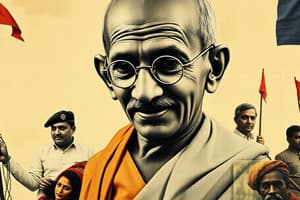Podcast
Questions and Answers
What significant challenge did Gandhi face while studying in London?
What significant challenge did Gandhi face while studying in London?
- Cultural challenges and adapting to Western lifestyle (correct)
- Discrimination due to his Indian heritage
- Isolation from his family and friends
- Financial difficulties in paying for education
Which two Western thinkers significantly influenced Gandhi's views on civil disobedience?
Which two Western thinkers significantly influenced Gandhi's views on civil disobedience?
- John Stuart Mill and Albert Einstein
- Thomas Jefferson and George Orwell
- Henry David Thoreau and Leo Tolstoy (correct)
- Martin Luther King Jr. and Richard Wright
What was the primary focus of Gandhi's early work in South Africa?
What was the primary focus of Gandhi's early work in South Africa?
- Working solely as a legal advisor
- Teaching Indian culture to South Africans
- Starting a new political party
- Fighting against racial discrimination (correct)
At what age did Gandhi marry Kasturba Makhanji?
At what age did Gandhi marry Kasturba Makhanji?
What principle established by Gandhi in South Africa became a cornerstone of his activism?
What principle established by Gandhi in South Africa became a cornerstone of his activism?
Flashcards are hidden until you start studying
Study Notes
Gandhi's Early Life
-
Birth and Family Background
- Born on October 2, 1869, in Porbandar, Gujarat, India.
- Father: Karamchand Gandhi, a local politician.
- Mother: Putlibai, deeply religious and influential in his early life.
-
Education
- Attended school in Porbandar and later moved to Rajkot for further education.
- In 1888, traveled to London to study law at University College London.
- Faced cultural challenges and adapted to Western lifestyle while maintaining Indian values.
-
Influences
- Early exposure to Hindu philosophies and Jain principles, emphasizing non-violence and truth.
- Influenced by Western thinkers, including Henry David Thoreau and Leo Tolstoy, particularly their views on civil disobedience and morality.
-
Marriage
- Married Kasturba Makhanji in 1883 at age 13, an arranged marriage.
- Shared a lifelong partnership, facing numerous challenges together.
-
First Experiences in South Africa
- Moved to South Africa in 1893 to work as a legal advisor.
- Faced racial discrimination, which profoundly impacted his worldview.
- Started to develop his philosophy of nonviolent resistance (Satyagraha) in response to injustice.
-
Key Developments
- Initially focused on legal work but became increasingly involved in civil rights activism.
- Founded the Natal Indian Congress in 1894 to fight discrimination against Indians in South Africa.
-
Significance of Early Life
- Formative experiences in India and South Africa shaped his approach to social justice and activism.
- Established the foundation for his later work in India, advocating for independence and civil rights through nonviolent means.
Gandhi's Early Life
- Born on October 2, 1869, in Porbandar, Gujarat, India.
- Father, Karamchand Gandhi, served as a local politician; mother, Putlibai, was deeply religious and influenced Gandhi's character.
- Attended school in Porbandar, later moved to Rajkot, and in 1888 traveled to London to study law at University College London.
- Encountered cultural challenges in London but managed to adapt to Western norms while preserving his Indian values.
- Influenced by Hindu philosophies and Jain principles, which emphasized non-violence and truth.
- Impacted by Western thinkers like Henry David Thoreau and Leo Tolstoy, especially regarding civil disobedience and moral philosophy.
- Married Kasturba Makhanji in 1883 at age 13 through an arranged marriage; they shared a lifelong partnership despite facing numerous obstacles.
- Moved to South Africa in 1893 to work as a legal advisor, where he first encountered racial discrimination.
- The experience of racial injustice in South Africa significantly shaped his worldview and commitment to social justice.
- Developed his philosophy of nonviolent resistance, known as Satyagraha, as a response to systemic injustices faced by Indians in South Africa.
- Initially focused on legal work but gradually became more involved in civil rights activism in South Africa.
- Founded the Natal Indian Congress in 1894 to combat discrimination against the Indian community in South Africa.
- Formative experiences in both India and South Africa laid the groundwork for his later activism in India, promoting independence and civil rights through nonviolent methods.
Studying That Suits You
Use AI to generate personalized quizzes and flashcards to suit your learning preferences.




